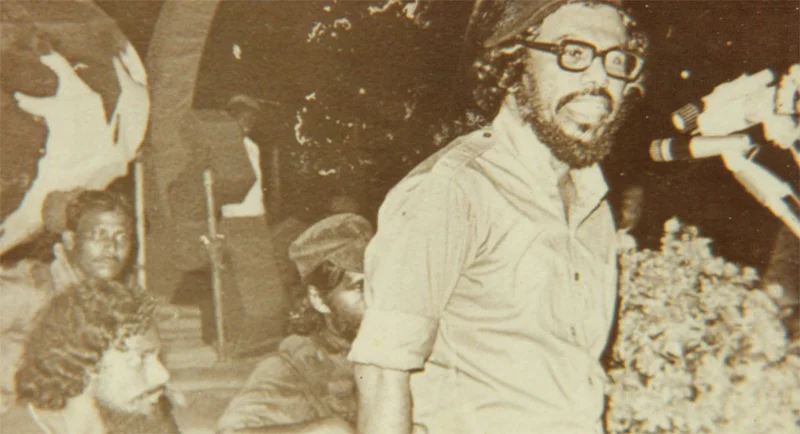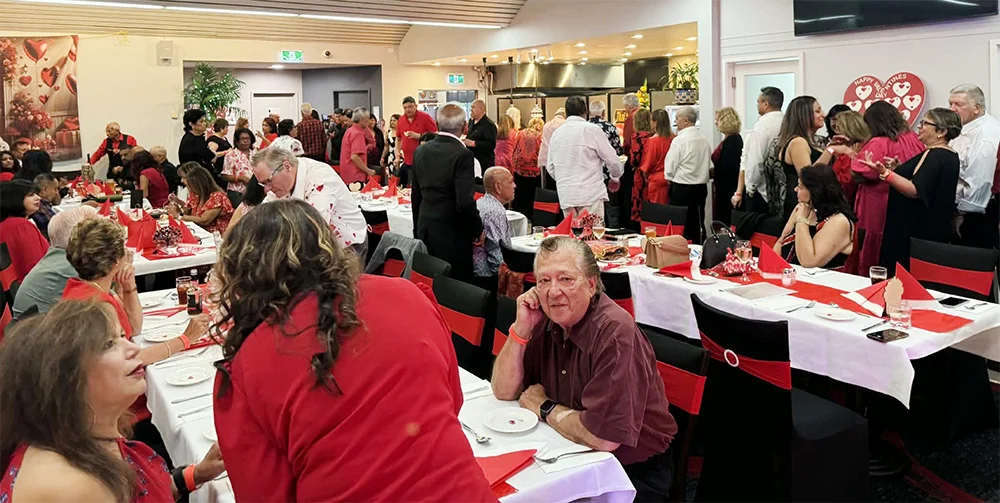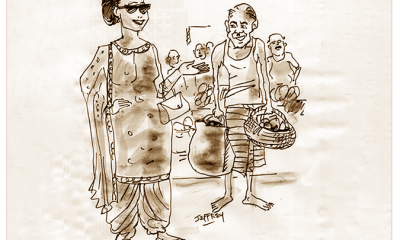Features
Brilliant Bougainvillea

Short story
by Ruki Attygalle
The hospital matron glanced up from her desk and for a moment compassion clouded her eyes, as she looked at the small, frail woman standing before her desk, shakily holding out a typed sheet of paper.
“Ah…. you got our letter came on the 5.30 bus from Matara this morning. Matron Nona. I … I… can’t understand My son — Ranjit — has been transferred to the psychiatric ward?” Tears welled in Somawathie’s eyes.
The matron’s sigh was hardly noticeable. There were so many cases. Her training forbade emotional reaction.
She said gently, “His head wound is healing nicely. But you see, there are other problems.
“He was so much better the last time I saw him, about two weeks ago! The nurse also said so… .” Somawathie wiped her eyes with her sari pota and pushed back a strand of grey hair that had loosened itself from the small tight knot at the back of her head.
“Did he speak to you then? Has he said anything to you on any of your visits?”
“Yes … no … nothing much, because so much pain, no? His head all bandaged.” She blew her nose into a handkerchief which she took out from inside her hatte.
“Amme, I understand, but try and tell us. His bandages were off when you saw him, two weeks ago.”
“Yes, with the blessings of the gods! He was looking fine then That is why I thought he would be discharged soon.”
The matron sighed. It was always the same. Contradictions muddled thoughts, in times of stress. Gently she said, “This Amme. can you repeat to us even a word or two he said? You see, he refuses to talk to us.”
The overhead fan creaked, shifting humid air from one side’ of the room to the other. The work-worn hands of the mother twisted together nervously. Her eyebrows knit, deepening the already existing lines on her forehead as she tried to remember.’
“He – he was a quiet boy, never much of a talker. Kept to himself. Didn’t even join the village boys. They called him the upasakaya. We just could not believe it, when he said that he had joined the army.”
The matron interrupted. “Did your son say anything to you about how he got his injuries? Or anything at all?”
Somawathie’s bleary eyes took on a distant look as she tried to think back, to recollect. She remembered her fear for her son’s life when she was first told that he had been brought to the army hospital, with injuries to his head. She remembered seeing him lying on his side on the iron bed, with bandaged head and motionless body. She had stroked his arm gently, and bending over, asked him whether he could hear her. But he did not respond. Then a nurse led her away saying, “He is still in shock, and it’s best to let him rest now.”
The next time she visited him, a week later, he was seated in bed leaning against the bedhead with his eyes closed, his head still firmly bandaged. At first, she had thought he was in deep meditation, but then she saw his lips moving silently and presumed he was praying. She had waited in silence for a long time before she spoke.
“I have come to see you, Putha. Are you feeling better now?” Perhaps he hadn’t finished his prayers because he did not answer. She gave him more time, before she spoke again.
“Ranjit, look at me, Putha, I have come all the way from Matara to see you. Please speak to me.” Still silence. Yet she had continued trying to engage him in conversation.
“Tell me Putha, what happened to you? I was so relieved when they said that you had no gunshot injuries. How did it happen? Was it a bomb blast? We never get to hear what really happens to our children! Putha, please tell me what happened,” she pleaded.
Then he suddenly spoke, “I don’t know. I can’t remember,” but remained motionless with his eyes closed.
Somawathie continued talking to him although he had withdrawn once more into his lonely silence. She had told him about the bodhi poojas she was carrying out to bring about his full recovery; how the priest asked after him every time she went to the temple; that pirith was being chanted for him every day.
She touched his hand, but he remained unresponsive. Perhaps he was tired, she’d thought, and needed to rest. As she bent to touch his shoulder and bid him goodbye, she heard him whisper to himself, panati-pata veramanisikka padam samadiyami mouthing the precept to abstain from killing. He is observing his five precepts she had thought, but then, he seemed to be repeating the first precept over and over again, as though he had forgotten the rest.
The next time she saw him he was walking towards his bed returning from the toilet. His head had been shaven. The bandage had been removed and the back of his head was covered with dressing held together with bands of sticking plaster. He looked so different, but better, and she was pleased.
He had walked past her and sat on the bed. Obviously, he had seen her, she’d thought, so she walked up to him and laughing said, “So, now you only need a yellow robe and you can join the Sangha!”
He had turned his face away from her. Perhaps she had said the wrong thing, even though she had meant it to be light banter. She was happy to see him better, much better, and wanted him to feel good too.
She winced, as her mind raced back to the time when Ranji went missing for several hours after a row with his father. She had eventually found him seated under a coconut tree by the kamatha, his face swollen with crying. Eyes broody, unhappy.
“Where were you this morning?” his father had demand angrily.
“I was helping out at Sunday School, Thatha.”
“So, helping at Sunday School is more important than helping your father in the field? The field that brings you the rice that fills your belly? Do you call yourself a male?” he sneered.
“You are worse than a woman. Your sisters have more energy in them than you have. They are a credit to this household, unlike you. See how they work. All you can do is to get to a side and read books or creep to the temple! You may as well shave your head and go live in the temple!”
The derision in the father’s voice had hung heavy in the room like dark monsoon clouds. With head hung low, a sinking heart, trying to hold back tears of humiliation that stung his eyes, Ranjit cringed out of the house. His relationship with his father had never been an easy one. He had always known that he failed to measure up to his father’s expectations. Sitting under the tree brooding, he felt as though an old wound he had tried to keep at bay, to ignore, had started bleeding. His sense of inadequacy and alienation ran deep. I’ll show him that I am not the weakling he thinks I am. I will join the army.
“Putha,” said Somawathie, gingerly placing the comb of pIantains she’d brought for him on the bedside table. “Aren’t you going to look at the plantains I brought you? They are just how you like them – not overripe.” He took no notice.
“Ranjit, are you angry with me? I was only joking, Putha, about you looking like a Buddhist monk.” But he remained silent, his eyes fixed on the blank wall.
“Your sisters are worried about you. In fact, Prema wanted to come with me today, but I didn’t think she should be travelling such a long distance in her condition. The baby is due end of the month.” He didn’t seem to be listening.
“Why don’t you talk to me, Putha? Have I annoyed you?” “No,” he snapped, suddenly, harshly.
“Then why don’t you talk to me? I have come all the way from Matara and you won’t even look at me!”
“Amma! I need to think. I need time to remember. I have to sort things out,” he almost shouted at her, not hiding his annoyance. “What things Putha?”
He did not answer; but lay down on the bed and shut his eyes and shut her out.
The Matron’s voice brought her back to the present. “Try to remember his words,” she was saying.
“I think he didn’t like it when I joked with him and said he looked like a monk, with his shaven head.”
The Matron sighed. She had seen too many cases like this where there was no easy answer. But Ranjit had been an exceptionally docile patient, doing what he was told to do, never complaining. But this silence from a man, so young … something was wrong … radically wrong. Strange, that the window beside his bed was always kept closed with the curtains drawn. No sooner the nurse opened it, he’d get out of bed and shut it. How could he be helped if he wouldn’t even talk to the doctors?
The mother gingerly touched the Matron’s hand in a gesture of pleading. “What happened to my boy, Matron? How did he get hurt? We are never told.”
A division of the Sri Lanka Army, with Ranjit among 40 soldiers led by a Captain, were detailed to search a village in Vavuniya believed to be harbouring Tigers – cadres of the Liberation Tigers of Tamil Eelam. Shooting had broken out, and hand grenades thrown at the soldiers.
“We lost 14 soldiers,” the matron said quietly. “Several were very badly wounded. Your son was lucky to have escaped with only a head injury. What is so strange is, that he seems to have been hit with a blunt instrument. He won’t tell us what happened.”
“That is because he does not know. He said he couldn’t member what happened.”
“Did he actually say so?” The matron queried eagerly.
“Yes,” said the mother, “He said he needed time to think. He said he needed time to remember.” His words rang strong in her mind now.
Time. Yes. Remembering what?
Ranjit walked slowly to the window. Although he tried not to look as he reached out to shut the window, he couldn’t help but notice from the corner of his eye the bougainvillea he now hated much. The creeper had hooked its treacherous thorns on to the trunk and branches of a mango tree, crept up stealthily and then burst into bloom. It was the colour he couldn’t stand.
It ‘wasn’t the common purple-red, nor an orange-red, rather, it was a deep, deep, red, the colour of blood. The colour that seeped through his eyes, and into his brain. It flooded inside and created a pressure in his head that was unbearable. It was worse than the pain of his wound. Why did they insist on opening the window!
He gently touched the dressing at the back of his head as he ,tried to remember for the umpteenth time what happened on that fateful day. The more he tried, the more his grip on his memory slipped away, his mind like a shattered mirror, its pieces scattered. As he tried to piece a few together, they disintegrate again into splintered fragments. A kaleidoscope of images’; scenes, noises, smells, feelings, memories – distant and recent advanced, receded, merged, unceasingly. He desperately strain
recognize a pattern; to insert the pieces of the jigsaw together and make up a picture he could comprehend.
Suddenly his body jerks with the sound of an explosion. A overpowering smell of gunpowder, blood, and singed flesh assail him. He is engulfed in the odour of death.
Then the kaleidoscope shifts and he is walking along a jungle path which, dream-like, turns into a field where the village boys are playing.
“Come and join us – we are catching grasshoppers,” they shout He shrinks back. “Are you afraid?” they taunt. “Grasshoppers don’t bite.”
“I’m not afraid of grasshoppers,” he affirms. Cupping his bands he traps a grasshopper on the ground. He feels its frantic movements against the hollow of his cupped palms.
“Grab it. Pick it up.” They bellow.
“No,” he says, “I may hurt it. It may die.”
“Coward! Coward! Coward!” they taunt with evil laughter. The word ‘coward’ ricochets in his head, as gunshots blast, around him.
“Shoot!” a voice booms behind him. “Shoot to kill. You blood coward shoot!”
His insides twist in fear as if an invisible band is clenching his guts. He lifts his gun and points at the young woman running towards him.
“Please don’t kill me. Please. Please,” she screams in Tamil as she draws closer with out-stretched arms. The white gemstone on her nostril glints as the sunlight catches it.
He places his finger on the trigger.
“Shoot!” the booming voice commands. “Shoot, you idiot!”
Images and sounds recede. Something tugs at him, sucking him down into a dark void of exhaustion; he struggles frantically and drags himself out slowly. The kaleidoscope shifts again.
His mother is seated cross-legged in her room on the cement floor. He is seated in her lap. She takes his little hands and places his palms together. He repeats the Pali stanza after her. Panatipata veramani sikkbapadam samadiyami . …
That’s the first precept she says. Then she explains what it means. You must never take the life of any living creature. Yes, not even an ant. Killing is a sin.
Suddenly the vision explodes like fireworks against his eyelids. Images pile one on top of another. Bodies thrown up in the air, coming down in pieces; blood and shattered bone; heads with eyeless black sockets. Shrill cries of terror.
The vision comes upon him again. The woman running towards him with outstretched arms. “Please, don’t kill me…
“Shoot! Shoot!”
He feels the coldness of the trigger on his forefinger. He feels the wetness of urine running down his leg.
“Coward! Coward! Coward!”
A gunshot echoes in his head. The woman crumples to the ground. He smells blood as he too collapses and lies on the parched earth. Intense pain stings like live coals at the back of his head.
“Ranjit,” the Matron’s voice grated on his raw nerves. “Your mother is here to see you.”
Ranjit’s fists clenched. Why couldn’t he be left alone! He needed to sort things out in his head. He needed to know what happened. He needed time to remember.
“Get out! Get out!” he screamed. “Just leave me alone.” Somawathie stepped back in shock, unbelieving, desperate.
Captain Welgama’s heavy boots stomped along the grey corridor behind the woman in the blue uniform. Suddenly, she slowed down, then stopped and looked at him.
“I’m telling you once again, Captain, Ranjit will not talk. He does not talk to anyone, and if he does, it will only be to chase you out.”
“But I need to talk to him Matron. It is important to me and perhaps to him too. I would have come earlier if I was allowed, but I was discharged from hospital only yesterday.” His voice was powerful even though he tried to speak softly. “You say he can’t remember what happened to him?”
“That’s what he told his mother. He does not speak to us.” They resumed walking.
The Captain frowned. “Maybe I could jog his memory. You see, we were fighting quite close to each other during the attack. saw him collapse, just before I got shot in my leg.”
He took out a handkerchief and wiped his face. “Tell me Matron, could Ranjit’s present problems be the result of the blow to his head?”
“I don’t know Captain, I’m not a doctor. Ranjit did suffer concussion. Sometimes, people can’t remember because they subconsciously block out memories, which are too painful. T here could be other reasons too for his loss of memory.”
The matron stopped at the entrance to Ward 12 and opened he door.
“Captain, I don’t think you should stay too long,” she murmured, moving towards the far end of the ward. Ranjit was lying on his bed with his eyes closed.
“You have a visitor, Ranjit,” the matron said with forced cheerfulness.
Ranjit screwed up his eyelids and tensed his body as if in anticipation of an onslaught. He was determined to resist any attempt to divert his attention from the vital task he had: to put together his shattered thoughts and make sense of the images that constantly besieged him.
“Hello Ranjit, how are you?” Captain Welgama tried to keep his voice down. “I would have come to see you earlier, but I was in hospital too. I was shot in my leg.” He dragged the chair that was against the wall by the window and sat by Ranjit’s bed.
Ranjit sat up as if galvanized by electricity. The voice boomed in his head echoing, vibrating like the sound of a gong. Shoot!
Shoot! Coward! Idiot! Shoot! His hands crumpled and clenched the bed sheet. His eyes stared at Captain Welgama unseeing. The captain stood up and placed his hands on Ranjit’s shoulders.
“I’m sorry, man, I’m truly sorry for what I did to you. I just lost control.”
Ranjit looked at Welgama, trying to, but not understanding him.
“I saw the woman running towards you, and you were in a better position to shoot. I couldn’t understand why you were, hesitating
The puzzle was slowly coming together in Ranjit’s head. “But’ she was asking to be spared, she was innocent, she was coming towards me with outstretched arms…
“Yes, but she could have been a suicide bomber. Why was she running towards you, instead of running away? What happened to all those months of training?”
“Was she…?”
“What?” Welgama interjected.
“A suicide bomber?”
“No, as it happens. But she could have been!”
Ranjit’s eyes were fixed on the bare wall, but his mind was seeing the woman, running towards him with her arms stretched out, pleading. He felt his hands lifting the gun as if in slow motion. He felt his finger on the trigger. The voice boomed from somewhere behind him. “Shoot! Shoot!” and suddenly his mind went blank.
The captain saw the anguish on the young man’s face and tried to say something to comfort him. But he couldn’t think of what to say. For a few moments they were locked in silence.
“You see, Ranjit,” Welgama said gently, as if speaking to a child, “by hesitating, you were putting so many lives in jeopardy. That is why I lost my temper. I brought my gun down on your head, with all the energy I could muster. It was such a savage blow; I might have killed you. I am sorry, Son.”
“I can’t remember you hitting me, or even falling down. I saw her falling after I’d shot her, and the next thing I remember is lying on the ground feeling a great pain in my head.”
“But you didn’t shoot her! That is why I hit you. I was behind you when I shot her. I shot her and then whacked you.”
Ranjit looked at the captain’s face, suddenly noticing his features for the first time. The deep-set eyes beneath his well-defined eyebrows, the slim long nose, the full lips and the slightly protruding teeth, and he felt a surge of gratitude. Gratitude to a man who helped him back to his senses; a man who’d lifted the heavy oppression that had been weighing him down, so long. The man who had used his gun on him with ferocity but now had brought resolution to his paralyzing mental turmoil.
“Did you say I didn’t kill her?” Ranjit wanted to hear it over and over again till every brain cell in his head was imbued with this knowledge. “Are you sure, Sir, are you sure?” Tension from his face and body was visibly easing. He felt a lightness of body and mind he had previously not experienced.
“Of course, you didn’t, man! I wish you had. Then you wouldn’t have suffered that head injury.” He walked to the window, drew the curtains apart and opened it. “It’s so hot, man, I don’t know how you stay in this room with the window closed!”
The curtains danced as a cool breeze blew in through the window.
“That is a beautiful bougainvillea,” commented the Captain, looking out. “It’s an unusual colour.”
Ranjit looked at the bougainvillea with new eyes. “Yes, Sir,” he said, “It is a brilliant colour.”
Features
Ukraine crisis continuing to highlight worsening ‘Global Disorder’

 The world has unhappily arrived at the 4th anniversary of the Russian invasion of Ukraine and as could be seen a resolution to the long-bleeding war is nowhere in sight. In fact the crisis has taken a turn for the worse with the Russian political leadership refusing to see the uselessness of its suicidal invasion and the principal power groupings of the West even more tenaciously standing opposed to the invasion.
The world has unhappily arrived at the 4th anniversary of the Russian invasion of Ukraine and as could be seen a resolution to the long-bleeding war is nowhere in sight. In fact the crisis has taken a turn for the worse with the Russian political leadership refusing to see the uselessness of its suicidal invasion and the principal power groupings of the West even more tenaciously standing opposed to the invasion.
One fatal consequence of the foregoing trends is relentlessly increasing ‘Global Disorder’ and the heightening possibility of a regional war of the kind that broke out in Europe in the late thirties at the height of Nazi dictator Adolph Hitler’s reckless territorial expansions. Needless to say, that regional war led to the Second World War. As a result, sections of world opinion could not be faulted for believing that another World War is very much at hand unless peace making comes to the fore.
Interestingly, the outbreak of the Second World War coincided with the collapsing of the League of Nations, which was seen as ineffective in the task of fostering and maintaining world law and order and peace. Needless to say, the ‘League’ was supplanted by the UN and the question on the lips of the informed is whether the fate of the ‘League’ would also befall the UN in view of its perceived inability to command any authority worldwide, particularly in the wake of the Ukraine blood-letting.
The latter poser ought to remind the world that its future is gravely at risk, provided there is a consensus among the powers that matter to end the Ukraine crisis by peaceful means. The question also ought to remind the world of the urgency of restoring to the UN system its authority and effectiveness. The spectre of another World War could not be completely warded off unless this challenge is faced and resolved by the world community consensually and peacefully.
It defies comprehension as to why the Russian political leadership insists on prolonging the invasion, particularly considering the prohibitive human costs it is incurring for Russia. There is no sign of Ukraine caving-in to Russian pressure on the battle field and allowing Russia to have its own way and one wonders whether Ukraine is going the way of Afghanistan for Russia. If so the invasion is an abject failure.
The Russian political leadership would do well to go for a negotiated settlement and thereby ensure peace for the Russian people, Ukraine and the rest of Europe. By drawing on the services of the UN for this purpose, Russian political leaders would be restoring to the UN its dignity and rightful position in the affairs of the world.
Russia, meanwhile, would also do well not to depend too much on the Trump administration to find a negotiated end to the crisis. This is in view of the proved unreliability of the Trump government and the noted tendency of President Trump to change his mind on questions of the first importance far too frequently. Against this backdrop the UN would prove the more reliable partner to work with.
While there is no sign of Russia backing down, there are clearly no indications that going forward Russia’s invasion would render its final aims easily attainable either. Both NATO and the EU, for example, are making it amply clear that they would be staunchly standing by Ukraine. That is, Ukraine would be consistently armed and provided for in every relevant respect by these Western formations. Given these organizations’ continuing power it is difficult to see Ukraine being abandoned in the foreseeable future.
Accordingly, the Ukraine war would continue to painfully grind on piling misery on the Ukraine and Russian people. There is clearly nothing in this war worth speaking of for the two peoples concerned and it will be an action of the profoundest humanity for the Russian political leadership to engage in peace talks with its adversaries.
It will be in order for all countries to back a peaceful solution to the Ukraine nightmare considering that a continued commitment to the UN Charter would be in their best interests. On the question of sovereignty alone Ukraine’s rights have been grossly violated by Russia and it is obligatory on the part of every state that cherishes its sovereignty to back Ukraine to the hilt.
Barring a few, most states of the West could be expected to be supportive of Ukraine but the global South presents some complexities which get in the way of it standing by the side of Ukraine without reservations. One factor is economic dependence on Russia and in these instances countries’ national interests could outweigh other considerations on the issue of deciding between Ukraine and Russia. Needless to say, there is no easy way out of such dilemmas.
However, democracies of the South would have no choice but to place principle above self interest and throw in their lot with Ukraine if they are not to escape the charge of duplicity, double talk and double think. The rest of the South, and we have numerous political identities among them, would do well to come together, consult closely and consider as to how they could collectively work towards a peaceful and fair solution in Ukraine.
More broadly, crises such as that in Ukraine, need to be seen by the international community as a challenge to its humanity, since the essential identity of the human being as a peacemaker is being put to the test in these prolonged and dehumanizing wars. Accordingly, what is at stake basically is humankind’s fundamental identity or the continuation of civilization. Put simply, the choice is between humanity and barbarity.
The ‘Swing States’ of the South, such as India, Indonesia, South Africa and to a lesser extent Brazil, are obliged to put their ‘ best foot forward’ in these undertakings of a potentially historic nature. While the humanistic character of their mission needs to be highlighted most, the economic and material costs of these wasting wars, which are felt far and wide, need to be constantly focused on as well.
It is a time to protect humanity and the essential principles of democracy. It is when confronted by the magnitude and scale of these tasks that the vital importance of the UN could come to be appreciated by human kind. This is primarily on account of the multi-dimensional operations of the UN. The latter would prove an ideal companion of the South if and when it plays the role of a true peace maker.
Features
JVP: From “Hammer and Sickle” to Social Democracy – Or not?

The National People’s Power (NPP), led by the Janatha Vimukthi Peramuna (JVP), came to power promising democratic renewal and long-awaited economic, educational, healthcare, and social transformation. It pledged to build a modern Sri Lanka rooted in democratic values while steering the country toward its vision of Democratic Socialism. For many supporters, the NPP’s rise to the pinnacle of political power represents a historic opportunity to reset the nation’s direction.
Yet recent developments have stirred unease. Statements by several senior ministers and certain policy signals have prompted critics to question whether the government’s path remains firmly democratic. Some warn that in the pursuit of rapid development and social justice, central pillars of the NPP’s election campaign, there may be a growing temptation to consolidate power in ways that edge toward policies of old “Hammer & Sickle.”
Is the NPP committed to pluralistic democratic socialism, or is Sri Lanka witnessing the early signs of a more centralised political model? To answer this question, it is necessary to revisit the JVP’s ideological history, examine the pressures that shape governing parties once in power, and weigh the potential consequences, both promising and perilous, of any shift in direction.
History of the JVP
The JVP emerged in the mid-1960s with a revolutionary agenda, mobilising youth through its Five Lecture Programme, which criticised capitalist policies, questioned the country’s “real independence,” opposed Indian influence, and called for armed struggle. This ideology culminated in the 1971-armed uprising against the elected government, leading to widespread violence, a harsh state crackdown, mass arrests, and the banning of the party.
Although suppressed, the JVP later re-entered democratic politics after its leaders were imprisoned and eventually pardoned. In the 1980s, after electoral defeat, the JVP shifted from strict Marxist-Leninist ideology toward a national, framework known as “Jathika Chinthanaya”, while maintaining strong opposition to Indian involvement.
However, it launched a second violent insurgency in 1988–1989, resulting in significant loss of life and severe repression, including the killing of its leader, Rohana Wijeweera. These events marked a decisive turning point, after which the party gradually moved away from armed struggle and embraced parliamentary politics.
By 1994, the JVP abandoned armed insurrection and embraced parliamentary democracy. While retaining its Marxist-Leninist identity, it adopted a more pragmatic socialist approach, seeking influence through elections rather than violence.
Embracing Parliamentary Democracy
The party served as Ministers and Deputy Ministers under President Chandrika Kumaratunga (2004–2005) and later supported Mahinda Rajapaksa in the 2005 presidential and subsequent parliamentary elections. Between 2005 and 2010, the JVP aligned with the Rajapaksa government in opposing federalism and supporting a unitary state.
Historically, the JVP opposed federalism. Under Anura Kumara Dissanayake (AKD), however, there appears to be a strategic shift toward decentralisation and inclusivity, without formally endorsing federalism. Since 2019, the NPP/JVP has criticised successive governments for failing to implement the 13th Amendment fully. This transformation is real and should be acknowledged.
Reports indicate the NPP/JVP is drafting a new constitution, but there is limited public clarity on its position regarding abolishing the Executive Presidency and devolving powers to Provincial Councils. Sri Lanka can chart a path toward a united, prosperous future where all citizens feel valued and represented. Therefore, I hope that NPP will consider the Provincial Councils in their current form might best serve as a relic of the past, making way for more cohesive and efficient systems of governance.
It is also a fact that many parties have historically criticised the Executive Presidency while in opposition, only to retain it in power. Whether the NPP/JVP will pursue genuine reform remains a subject of debate.
Democratic Concerns State Power
A recent statement by a senior Cabinet Minister that the party holds government power but has not yet “captured” broader state power raises fundamental questions. In a parliamentary democracy, winning government is the highest legitimate authority a party can obtain. Government power is temporary which is granted by voters, limited by the Constitution, and revocable at elections.
State power is permanent and it lies with state institutions i. e. the judiciary, administrative service, armed forces, law enforcement, and independent commissions. These bodies must remain politically neutral and serve the Constitution, to prevent any ruling party from dominating the permanent machinery of governance.
To frame democratic victory as incomplete without “capturing” state power, suggests a conception of power that goes beyond electoral legitimacy. It echoes a revolutionary mindset highlighting the real transformation requires ideological alignment of the state itself.
Past few decades, Sri Lanka has suffered from politicised institutions. Replacing one form of control with another is not reform, it is substitution.
Judiciary and Due Process
Public frustration over past corruption is understandable. However, allegations must be addressed through due legal process. In a democracy, individuals are innocent until proven guilty in a court of law. When parliamentarians publicly pass judgments on opposition figures before judicial proceedings conclude, it risks undermining the rule of law and raising concerns about political overreach.
Concerns are further heightened when there are perceptions that the rule of law is not applied equally, particularly if members of the governing party are treated differently in similar circumstances in the recent past. Unequal enforcement of legal standards can erode public trust in institutions. If such patterns persist, they may raise broader questions about the strength and impartiality of democratic governance.
Village-Level Courts

Democratic Concerns
State Power
In another recent statement, by a senior Minister reiterated one of his earlier proposals to establish judicial courts at the village level to adjudicate certain legal cases, depending on the nature and severity of the alleged offences. While improving local access to justice may enhance efficiency, such courts require strong institutional safeguards.
As this proposal raises serious concerns, it bears characteristics often associated with totalitarian systems, where village-level courts may be controlled by ruling party “cadres” who preside over legal matters and pass judgments against individuals. Without strong safeguards to ensure independence, transparency, and adherence to the rule of law, such courts could be misused to suppress dissent and curtail legitimate political opposition.
Any reform of the judicial system must uphold constitutional protections and preserve the separation of powers. Failing to do so could raise broader concerns about democratic accountability and institutional independence.
Civil / Administrative Service
Before 1978, Sri Lanka’s civil service was widely respected for its professionalism and independence. Over time, however, political appointments increasingly influenced senior administrative positions.
There are growing concerns that some recent appointments to high-level administrative service posts by the NPP may also be politically motivated. Many voters expected systemic reform and a decisive shift toward merit-based governance under the NPP/JVP. It is disappointing to observe indications that similar patterns of politicisation may be continuing.
The real test of reform lies not in rhetoric but in institutional safeguards. Transparent selection criteria, independent oversight mechanisms, and clear accountability structures are essential to ensuring that the administrative service remains professional and non-partisan.
History shows that democracy does not usually collapse overnight. It erodes gradually when ruling parties seek to align permanent institutions with their own ideological or political objectives.
Strengthening institutional independence is not optional, it is imperative. Sri Lanka’s democratic future depends not only on who holds power, but on how responsibly that power is exercised.
Media Freedom
“I disapprove of what you say, but I will defend to the death your right to say it”
(Evelyn Beatrice Hall, describing Voltaire’s belief in freedom of speech.)
Recent reports suggest the NPP/JVP government is dissatisfied with parts of the media, accusing some outlets of political bias and even proposing bans for allegedly spreading false information. Such actions would be undemocratic and would weaken constructive criticism.
Governments already possess legal remedies for defamation. If laws are inadequate, they may be reviewed. However, this must not undermine the media’s fundamental right to fair, independent, and legitimate criticism of those in power.
Every government dislikes criticism. But mature democracies tolerate it. Any attempt to restrict the media risks eroding democratic freedoms and should be adamantly opposed by all who value an independent media.
Religion and Public Conduct
In the past, opposition parties accused the JVP of being hostile to religion, particularly toward Buddhist monks aligned with political opponents. Confirming this accusation, recently a few NPP/JVP ministers, MPs, and party supporters have publicly criticised Buddhist monks who speak and organise meetings against the government.
At the same time, social media contains intolerable language about the conduct of certain Buddhist monks. While misconduct by members of the clergy is concerning, it does not justify hostile or disrespectful reactions from politicians or the public.
Responding with anger and division contradicts the very Dhamma many claim to defend. Using monks as political tools, or attacking them publicly, only deepens social divisions. If there are genuine concerns about the monastic order, they should be addressed respectfully through proper religious channels rather than through public humiliation.
Economic Democracy
Following Sri Lanka’s 2022 fiscal crisis, the NPP/JVP revised its economic policy and aligned itself with a framework closer to Social Democracy. This shift suggests that the JVP has accepted capitalism as the economic system necessary to revive the collapsed economy. At the same time, it has emphasised redistribution, welfare measures, and regulatory reforms aimed at reducing inequality.
The NPP/JVP’s economic policy now focuses on reforming capitalism rather than replacing it. The party initially sought to renegotiate the IMF agreement to ease the burden on the public. However, it was unable to secure significant changes. A key long-term objective remains reducing dependency on imports. The NPP aims to promote local industries and agriculture, while supporting small and medium-sized enterprises (SMEs) to reduce unemployment and expand export capacity.
Although the party pledged to strengthen state-owned enterprises through improved management rather than outright privatisation, recent developments indicate a shift toward public-private partnerships and selective privatisation.
Overall, economic progress is gradually aligning with these reformed Capitalist policies. This approach marks a significant departure from the original “Hammer and Sickle” ideology associated with classical Marxist theory as articulated by thinkers such as Karl Marx, Vladimir Lenin, and Friedrich Engels.
If judged solely on economic direction, the shift from revolutionary rhetoric to reformist governance appears substantial.
Bribery and Corruption
The nation is deeply grateful to the NPP government for taking bold steps to minimise bribery and corruption, which have long been a cancer eating away at our society. For decades, this practice has existed from top politicians to the lowest levels of the state sector, and even within society at large. Full credit must be given to the NPP government for prioritising the fight against this unethical and deeply rooted problem. It is hoped that the law will be applied equally to everyone, irrespective of status or party affiliation.
However, the public remains sceptical about the delay in pressing charges against the alleged culprits. During the election campaign, the JVP claimed that it possessed substantial evidence, over one hundred files, sufficient to prosecute members of previous governments accused of misusing public funds. Are they now discovering that the evidence is not as concrete as initially suggested?
Conclusion
Having analysed the current situation of the NPP/JVP, it is evident that there are conflicting statements from some senior figures in the JVP. Some favour the continuation of the traditional “Hammer and Sickle” policies. Others within the NPP emphasise and implement aspects of Social Democratic policies. Considering these differences, the nation is entitled to seek clarity regarding the government’s present direction.
It remains to be seen whether the JVP is merely marking time before reintroducing its former ideological policies, or whether it has genuinely chosen the path of Social Democracy.
By Gamini Jayaweera
Features
Valentine’s Day fundraiser … a huge success

In Melbourne, Australia, catering veteran Chris Cannon hosted the annual Valentine’s Day fundraiser at the Springvale RSL, with all proceeds being donated to the Home of Compassion in Sri Lanka, run by the Mother Teresa Sisters.
The Valentine’s Day fundraiser was held on 14 February and the event featured music by Shey and George (of Redemption fame) and DJ Jeremy Ekanayake.

Shey and George providing the entertainment
The international buffet was a spread of Thai specialties and yummy Sri Lankan dishes and the large crowd present enjoyed the setup thoroughly, I’m told.

The lucky winner … trip to Sri Lanka
The Thai Street Food buffet was provided by Chris Cannon’s catering service, with his Thai wife, Annie, doing the needful.

The Cannon Team: Alice, Annie and Chris
His daughter, Alice, also played an active part in this fundraiser.
Chris, a Sri Lankan-born Melbourne resident, who has been hosting this annual event for several years, with all proceeds going to charity, attributes the success of this Valentine’s Day fundraiser to the team that worked tirelessly to make it a happening event.

Rose and a teddy for the ladies
“I’m ever so grateful to the Team that was responsible for the success of this fundraiser. They all worked with enthusiasm and the smiles on their faces, at the end of the event, said it all.”
It was a sell-out, with every lady receiving a rose and a teddy but, unfortunately, said Chris “we had to disappoint several who wanted tickets as it was a limited space venue.”
What’s more, there were also attractive prizes on offer, including a seven nights stay in Sri Lanka.
-

 Features5 days ago
Features5 days agoWhy does the state threaten Its people with yet another anti-terror law?
-

 Features5 days ago
Features5 days agoReconciliation, Mood of the Nation and the NPP Government
-

 Features5 days ago
Features5 days agoVictor Melder turns 90: Railwayman and bibliophile extraordinary
-

 Features4 days ago
Features4 days agoLOVEABLE BUT LETHAL: When four-legged stars remind us of a silent killer
-

 Features5 days ago
Features5 days agoVictor, the Friend of the Foreign Press
-

 Latest News6 days ago
Latest News6 days agoNew Zealand meet familiar opponents Pakistan at spin-friendly Premadasa
-

 Latest News6 days ago
Latest News6 days agoTariffs ruling is major blow to Trump’s second-term agenda
-

 Latest News6 days ago
Latest News6 days agoECB push back at Pakistan ‘shadow-ban’ reports ahead of Hundred auction

















